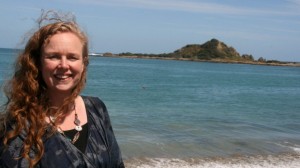Elspeth Tilley does the little things that many do on the homefront to protect the planet, from recycling and marching against climate change to encouraging her family to walk and take public transport.
On a global scale, though, the Massey University theatre and arts lecturer knows that many are tired of being bombarded with information and statistics about climate change.
On the eve of one of the most important global meetings, the United Nations Conference on Climate Change (COP21) in Paris, which starts on the evening of November 30 (NZ Time), her short, provocative play, Flotsam, has been accepted by the New York-based Climate Change Theatre Action group, as one of the official plays.
“Information about climate change is very depressing and leaves us all churned up, thinking the world’s going to end,” says Tilley. “The result is that people switch off. Instead, it works to reach people’s hearts and consciousness, and to help them think differently.”
Playwrights like David Geary, a Vancouver-based Maori playwright and Jacqueline Lawton, an award-winning black American playwright, are among 50 writers whose poetry, plays and songs were chosen by the action group to be performed before and during the Paris event. Not all will be held in Paris, though, and Tilley’s play is being shown in Chicago, Washington, New York and Virginia. Other productions range from living-room readings to fully produced shows, and from site-specific performances at the foot of glaciers to radio programmes and film adaptations.
Tilley says that climate change is often seen through a policy or scientific lens, and solutions are discussed only in political offices, boardrooms and negotiating halls.
Her play is based on the real-life case about a man from Kiribati – Ioane Teitoita – who was denied status as a climate change refugee and sent home. In a case which affected Tilley, the issue is battled out between a refugee application officer following the rules, and her teenage daughter, who challenges her mother about the case after following it on Facebook.
In Flotsam, the refugee officer says: “It’s not that simple, love. The law says there must be a well-founded fear of persecution causing serious harm to qualify for refugee status. Maybe there might be a cyclone causing serious harm, maybe not. But a cyclone isn’t persecution. I can’t override the wording of the law, it’s my job to apply the letter of the law. If it says definite serious harm, then I have to require definite serious harm to prove the application”.
The case of Teitoita, who was sent home, stuck with Massey Associate Professor Tilley, who says: “It’s symbolic of the system’s response. Eventually, we are going to have to welcome climate change refugees. We can’t keep turning a blind eye, treating them like an inconvenient teenager.”
Flotsam premiered here at a Massey University climate change event, Waves, earlier this month and each production overseas features local actors and directors – it’s being shown at the Institute for Excellence in American Contemporary Theatre in New York on Tuesday, chosen by Matthew Clinton Sekellick, an award-winning director. Theatre activism isn’t new to Tilley, who teaches a paper on the expressive arts, so her students have been involved in everything from a multimedia smokefree campaign on campus, to a play about GM corn.
“We emphasise artistic expression as both intrinsically worthwhile and as a means to an end. Art has aesthetic value, but it’s also powerful as a communication tool that can connect people with ideas, provoke new ways of looking at things, and create change.”
At the Waves event, Massey PhD student Sara McBride acted in the world premiere of Geary’s play, Morehu and Titi, about a tuatara and muttonbird heading for Antarctica on a floating island.
McBride, a disaster management communications specialist, has seen the effects of climate change first-hand, after working in the Solomon Islands as a volunteer communications advisor. “The Reef Islands was one of my areas, where you have 14,000 people living on coral atolls totalling 12 square kilometres. The area has eroded so much. Locals are losing their island, but they can’t leave, and it’s heartbreaking to watch.”
She says that climate change is now the most pressing issue for those working in disaster management. “It’s like, how can we fix this, or mitigate it?”
McBride also knows what it is like to live with the threat of disaster hanging above. Growing up in Washington state, she lived within 15 kilometres of the Hamburg nuclear site as her father was a nuclear chemist.
“We grew up with the threat of the nuclear plant melting down. We had to do drills regularly and we were told that if the nuclear facility went critical, we had to put a big white sheet up on our window to let the military know we were still alive.
“Working in disaster management has been a natural extension of my childhood.”
